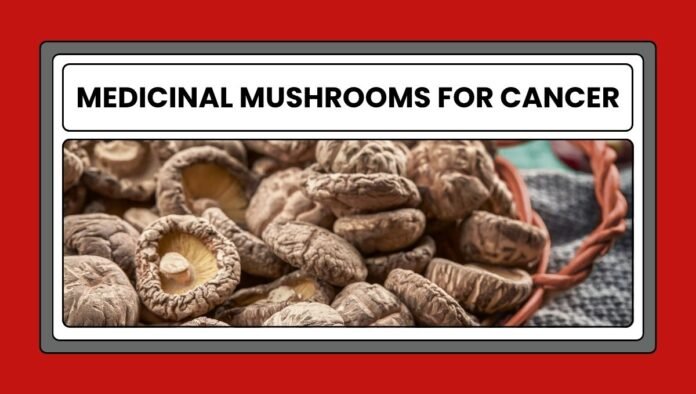What Science Says About Their Power of Mushrooms
For thousands of years, healers in Japan, China, and Siberia have quietly used mushrooms as medicine. Today, modern labs are discovering something remarkable: certain mushrooms contain powerful compounds that may help our bodies battle cancer. At TrendzCoop, we’ve dug into the research to separate hope from hype. What we are putting down might change how you view that humble shiitake in your stir-fry.
The Science Behind Cancer-Fighting Mushrooms
Researchers have discovered three key compounds in mushrooms that show real promise:
- Immune-Boosting Sugars (Beta-Glucans)
Found in turkey tail and shiitake mushrooms, these natural sugars act like “trainers” for your immune system. They teach your body’s defense cells to recognize and attack cancer cells more effectively. In Japan, an extract from turkey tail mushrooms (called PSK) is actually prescribed alongside chemotherapy for stomach cancer patients. Studies show it helps people live longer when combined with standard treatment.
- Tumor-Blocking Molecules (Triterpenes)
Reishi mushrooms are packed with these compounds. They work like nature’s “roadblocks” by:
– does not allows blood supply to tumors
– helps in stopping tumour to spread tremendously to other body rgans.
– Triggering self-destruction in cancer cells
- Brain-Protecting Compounds (Erinacines)
Found in lion’s mane mushroom, these unique substances can cross into the brain. Early studies suggest they might help protect against brain tumors and repair nerve damage caused by cancer treatments.

How Mushrooms Work Alongside Conventional Cancer Treatment
Mushrooms aren’t magic bullets, but research shows they can support conventional treatments in powerful ways:
– Turkey Tail + Chemotherapy
In a 10-year study of colon cancer patients, those taking turkey tail extract alongside chemo had nearly 30% better survival rates than those using chemo alone. Doctors believe the mushrooms help prevent chemo from weakening the immune system.
– Reishi + Radiation Therapy
When lung cancer patients took reishi extract during radiation treatment, they experienced less fatigue and maintained better immune function. Scans showed reduced tumor growth compared to radiation alone.
– Chaga Against Aggressive Cancers
Lab studies on aggressive oral and bladder cancers show chaga mushroom extract can “starve” tumor cells by disrupting their energy supply. In one experiment, chaga reduced cancer growth by 65% in 3D tumor models.
What You Need to Know Before Trying Medicinal Mushrooms
- Not All Supplements Are Equal
– prevent yourself from products using mushroom “roots” (mycelium). And check for products using actual mushrooms
– Look for “beta-glucan percentage” on labels (aim for 30%+)
– Trusted brands: Real Mushroom, Oriveda, Fungi Perfecti
- Safety First
– Talk to your oncologist before trying any mushroom supplements
– May interact with blood thinners or diabetes medications
– Not recommended for people with autoimmune conditions
- Simple Ways to Add Mushroo to Your Life
– Cook shiitake, maitake, or oyster mushrooms (always cook them!)
– Try turkey tail tea during cancer treatment (3g daily)
– Introduce chaga powder to morning oatmeal
The Future of Mushroom Medicine
Scientists are exploring exciting new frontiers:
– Nano-encapsulation: Making mushroom compounds more easily absorbed by the body
– Gut health connection: How mushroom improve gut bacteria to fight colon cancer
– AI-powered discovery: Using computers to find new cancer-fighting compounds in rare mushrooms
Key Takeaways
- Turkey tail, reishi, chaga, and lion’s mane show the strongest anti-cancer potential
- Mushrooms work best alongside conventional treatments—not as replacements
- Quality matters: Choose reputable suppliers who test their products
- Always work with your medical team when adding mushroom protocols
> “Nature’s pharmacy offers powerful tools, but they require wisdom to use well. Mushrooms are partners in healing—not miracles in a capsule.”
> — Dr. Lena Rodriguez, Integrative Oncologist
Trusted Resources for Further Learning
– [Cancer Research UK: Mushrooms in Cancer Care]
– [Memorial Sloan Kettering: Mushroom Supplements FAQ]
– [NIH Database of Mushroom Studies]
Your Next Step
If you’re considering medicinal mushroom:
- Discuss with your cancer care team
- Find an integrative oncologist
- Start with small amounts of cooked culinary mushrooms
Have questions about specific mushroom or cancer types? Share them in the comments below—we read every one and will address them in our next deep dive.




